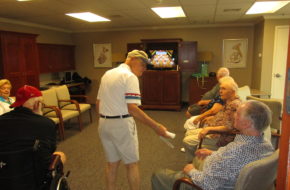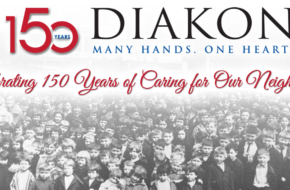I had heard the name Virginia “Ginny” Ebersole numerous times after the 2000 creation of Diakon that brought The Lutheran Home at Topton into my work-life, typically as the guardian of The Lutheran Home’s history as an orphanage.
Because I had a similar role in safeguarding the records of the children’s home operated by Tressler Lutheran Services—my former organization before the Diakon merger—I felt a sort of kinship with Ginny, even though the similarities ended there.
Ginny, after all, had actually grown up in the children’s home and then returned in retirement to the place of her childhood, living in one of independent-living cottages at The Lutheran Home, now a senior living community.
Although I had the privilege to work with Ginny the past two years, I wish I had learned to know her personally sooner because her commitment to protecting and preserving the history of the home was both outstanding and amazing. When someone wanted to know the history of a child who had been served by the home, everyone immediately turned to Ginny for that information.
But no longer. Virginia B. (Baer) Ebersole passed away last Sunday, July 24, at the age of 88.
Ginny lovingly told stories of her time at the home, to which she moved in 1933 when her mother passed away; her father’s work schedule made it difficult for him to take care of his family.
“We spent most days learning and studying, taking part in various activities including plays, and doing chores,” Ginny said during an interview for a 2014 Dialog article about her. “But the most important things we learned were respect, responsibility and how to work.”
When she turned 18, she left the home, typical for children coming of age. She married, raised a family and worked well into her 60s. When she and her late husband retired, the decision to return to Topton was an easy one.
Before long, Ginny became the unofficial archivist for Topton’s records.

“Ginny worked diligently to preserve the artifacts and rich history of the services provided by the orphanage at The Lutheran Home at Topton,” says Mark Pile, Diakon president/CEO. “She did this excellent volunteer work out of her love for and her personal roots at the orphanage and for the many friendships she maintained with those who lived at Topton, as well as the family and friends who have been part of that history. She will be deeply missed.”
My direct work with Ginny came the last two years as both of us served as members of the committee developing the planned restoration of Old Main, to house a permanency center related to Diakon Adoption & Foster Care—in many ways the direct descendant of the children’s home—and offices for Diakon Ministry Support.
She was very excited about this planned rebirth of the iconic building that in many ways defines The Lutheran Home at Topton campus.
Another communications staff member and I met with Ginny early on in this process to determine the extent of the archives she managed. One issue at the time was that, a year or two before, the original book that contains the names of the children served at Topton had gone missing. While there were copies of those records, Ginny was upset over the loss of this artifact.
During our tour of one section of the archives that day, I asked Ginny to describe the book. As she finished her description, I happened to look over to one shelf and something quite similar to her description caught my eye. I asked, “What is that?”
Her eyes widened and began to gleam. It was the book.
Obviously, whoever had taken the book had returned it to that spot unannounced. While we really had no significant role in finding the book, I have to say it was very gratifying to know that our trip had resulted in returning it to Ginny’s safekeeping.
Our hearts were gladdened just by the look on Ginny’s face.
I wish Ginny had lived to see the Old Main project completed, to see the building refurbished and renovated and serving its original purpose anew. But perhaps it is enough that she knew the project was under way.
And as we work to preserve the history of The Lutheran Home at Topton in this project, I know many of us will think frequently of Ginny.
I know as well that her spirit will be right there with us.
By William Swanger
Senior Vice President
Corporate Communications & Public Relations
Because we review comments, they do not appear immediately. Please do not submit each comment more than once. Please review our comment policy.









